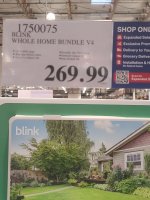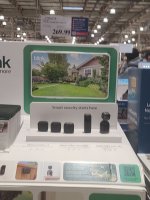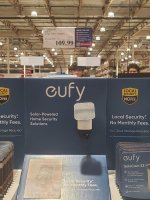This is such a can of worms.
Wyze has decent cameras that don't absolutely require an on-prem NVR. They can record to a local SD card with decent image quality and they can send video to a cloud host for you to view on your phone even if you're not home, albeit only in 10-second clips. Down side to most things that don't have an on prem NVR is that the companies that offer them pretty much all use servers provided in either Taiwan or mainland China and not all of them are fully secure. I have a couple Wyze cameras., one pointed so I can see the entrance to the parking lot where I live, the other pointed at my front door. My Wyze cameras don't zoom and Indiana doesn't do front license plates, but I do know when deliveries pull in or someone comes into the parking lot.
I also have a couple Echo Shows in other rooms that I can technically use as cameras if I need to. They don't see in the dark and they don't record, but they CAN show what's going on with my Wyze cameras OR help me out if my partner, some other houseguest or one of the handymen from my landlord needs something while I'm not home. There are other brands that do the same thing as Wyze like Eufy. I'm on a grandfathered $1/month plan for cloud recording with them. Defintely look at their service security before you invest; Wyze has had problems in that department.
I'm almost positive the cheapest overall package you can buy into is Ring but its outdoor cameras are kind of limited. Most people just buy a doorbell unit and call it a day, but there's an outdoor floodlight camera as well, plus a crap ton of other home automation sensors. The important thing is that Amazon Prime subscribers can get fully monitored Ring cheaper than anything else on the marked, even if I think they did raise it to $100/year/address. Most monitored systems are $25 - $50/month if they have an internet or security company component. Ring has a whole attending ecosystem for compatible devices it integrates well if you have other Amazon stuff like those Echo Shows I was talking about. Down sides to Ring are mostly that you're giving Amazon all this information and that Amazon will happily give up anything Cops ask it for. SimplySafe is another affordable choice and it doesn't HAVE to have an internet service component, but if you're skipping out on that part, you're probably better off with ...
ONVIF NVR systems. ONVIF is a standardized format for multicamera security systems. We're basically talking about Tivo for security cameras. The good news here is that you can mix and match cameras and back-end units as long as everything is standard. Issues here are that internet service either requires the same Chinese web services (Chinese companies make the recording and playback APIs for security video, so guess where their servers are) or some kind of PITA network setup that might be difficult to secure for someone who doesn't do that for a living. But, OK, you buy one of these things. It's basically a box with one or two HDDs in it and enough inputs for 12 or 16 cameras if you want that many. Cool. Speaking of cameras and also cans of worms, there's a lot of issues here. You generally want PTZ (Pan, Titl, Zoom) cameras with infrared recording. Placing and powering cameras can be challenging. You ideally want them hard-wired to ethernet if possible. Wifi cameras will sometimes just lose connectivity. Better cameras might need a battery swap every three or six months. They may be capable of local recording to an SD card and that SD card might top out at 64GB. It is not critically important to get 4k cameras. 4k eats drive space and it's most helpful for cameras being used to establish identity, so don't feel like everything needs to be the highest resolution video. There's an absolute art to camera placement. They need to be in places people won't fuck with them. Home intruders for example often know that Ring doorbell cams have a 150 degree field of view, so approaching one from one side and hammering it off its mount works very well. Anyway, you may also want cameras with public address capability or you may not. You may want fixed FOV cameras in some places instead of motion tracking ones. You may also find that what you think is best for positioning isn't ideal from a standpoint of establishing identity. ONVIF systems are extremely flexible, but they do require on-site monitoring to be of use.
All of this is to safe you're going to have to do a crap ton of research on your own to decide you best path forward. "Buy Ring and call it a day" is a valid strategy and will probably do what you need versus the overkill route of installing $2500 worth of IP cameras and a small fortune in outdoor Wifi APs, but you can definitely spend to your level of paranoia. I suspect you'll get more and better information from relevant subreddits but if you're really serious about it, definitely talk to professional installers. There are literally hundreds of companies making and selling systems and it extremely hard to get expert consensus on any of this stuff.
My setup is two Wyze cams, 4x Echo Shows (bedrooms, living room, bathroom), Ring door alarms on my front and balcony doors and at both sets of bedroom windows. I don't pay for Ring monitoring but I DO get notified if a door or window opens or if an Echo device hears breaking glass regardless. Ring notifications are generally exhausting, so most of what my Echo Shows do is silently display things as notifications happen so I don't have to look at my phone every time someone comes into my parking lot. I use a Hubitat for my home automation controls rather than the Amazon stuff. It also has some security-related routines on it. Amazon's options in that area are fairly limited.






